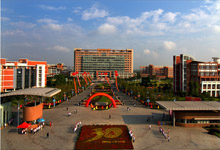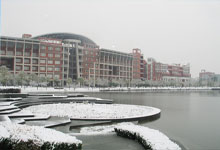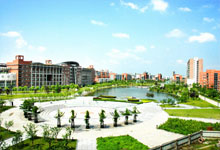 |
 |
 |
English-Taught Program(Bachelor)
Business Administration
Electronic Engineering
Computer Science and Technology
Mechatronic Engineering
Mechanical and Manufacturing Engineering
Telecommunication Engineering
Automation
Contacts
Campus Life



About Our CJLU
Founded in 1978, China Jiliang University is the only institution of regular undergraduate education for quality supervision, inspection and quarantine in China. It implements the administrative system of joint construction by the province and the ministry with the province taking the principal part. The University has the right to confer master’s degrees. It features on engineering majors and features in coordinated development of engineering, science, management, law, literature, economics, medicine (pharmacy) and philosophy etc. It boasts distinctive characteristics of university operation in measurement, quality, inspection, standards and other aspects. The University all along insists on the principle of “establish education in measurement, train students with standards and build a university with quality” and has formed an operation pattern in which undergraduate education is the main part and is supplemented with postgraduate and continuing education for adults. It enjoys the right to enroll international students and those from Hong Kong, Macau and Taiwan. Now Mr. Zhuang Songlin, member of the Chinese Academy of Engineering, is the honorary president of the University. Lin Jianzhong is the university president. The University is situated in Hangzhou, a well-known historical and cultural city and a world-famous touring and leisure resort. Occupying an area of 1580 mu (1,053,333m2), its fabulous environment makes it an ideal place for studying and doing academic research. At present, there are a total of 17 colleges (education department), which are, Electromechanical Engineering College, Measurement and Testing Engineering College, Information Engineering College, Scientific and Technological College of Optics and Electronics, College of Science and Engineering of Materials, Quality and Safety Engineering College, Economics and Management College, College of Science, College of Life Science, College of Law, College of Humanities and Social Science, College of Foreign Languages, College of Art Design, LiangXin College, Physical Education and Military Department, Adult (Further) Education College and Engineering Training Center. It also has an independent college (College of Modern Science and Technology). The University currently has 14 master’s degree programs, 42 undergraduate courses of which 9 are the key specialties at provincial level. Now it has more than 16000 full-time undergraduates and postgraduates, among which over 6000 are from the College of Modern Science and Technology China Jiliang University. It also has over 4000 registered students for continuing education. The University has a teaching and administrative staff of more than 1300 people, among which over 860 are full-time teachers. 86% full-time teachers hold doctor or master’s degrees. The University first and foremost insists on emphasizing disciplinary construction, and highlights the cultivation of features of disciplines. Now it has 1 state-level inspection center, 1 “Key of the Keys” discipline, 4 key disciplines, 1 key laboratory and 1 experiment base in Zhejiang province, 4 key disciplines constructed by the State Bureau of Quality and Technical Inspection, and 3 Trial Teaching and Learning Demonstration Centers and 1 Cultural Quality Education Base of Zhejiang Province. During the recent years, the University has been in charge of more than 280 scientific research projects of and above the provincial and ministerial levels among which over 80 are the projects of natural scientific funds of the state and the province. Altogether more than 170 monographs, academic works and textbooks have been published. The University places personnel cultivation as the foundation while focusing on both teaching and learning, and puts improving the quality of talent training at the place of the utmost importance. It continuously deepens the reform of education and teaching and has gradually formed the features of talent training of “Cultivating the high-quality talents with firm sense of quality, distinct consciousness of standards and strong capability of measurement” The quality of sources of students is rising in steadiness. The graduates are warmly welcomed by the employers. The bottom mark for enrolment eligibility for undergraduate students and the initial employment rate of the graduates take the lead among other colleges and universities of the province at all times. It has had over 36000 excellent graduates. The University adheres to the principle of open management. It actively conducts international exchanges and cooperation and has established intercollegiate cooperative relations with more than 20 institutes of higher education and scientific research in Germany, France, U.S., Australia, U.K. and other countries for academic exchanges, talent cultivation, cooperative education etc. It has also assumed many scientific research projects for international cooperation such as the topic of “Enterprise and Market Oriented Standardization” of the project of “EU-Asia Coupling”. On Sep. 21st 2007, the University won the Award for Higher Education of ISO Standardization on the 30th Conference of ISO, which is the first of the world.
Located in the beautiful tourist destination of Hangzhou, the capital city of Zhejiang province,ChinaJiliang University has been a well-known university for metrology (the science of measurement) since its establishment in 1978. It covers an area of about 1580 Mu (195 acres). It has been the only university qualified to award Bachelor’s and Master’s degrees in the fields of Quality Supervision, Inspection and Quarantine inChina. It is recognized as the top university inChinafor Metrology, Quality Engineering, Quality Supervision, and Standardization.
While engineering is the focus, CJLU is, however, a comprehensive university that offers many disciplines, including engineering, science, management, law, literature, economics, medicine, and philosophy. It has 18 colleges, 44 majors and about 19,000 full-time students. It has a research center for the humanities and social sciences, eight top provincial disciplines, and 16 master’s programs, including two engineering programs.